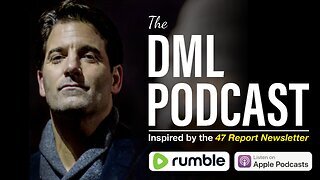Premium Only Content

Navigating Adversity with Faith: A Reflection on Psalm 35 and Biblical Leadership
In the heart of the Book of Psalms, Psalm 35 stands as a poignant expression of King David’s plea for divine intervention against his adversaries. This psalm, characterized by its vivid imagery and emotional depth, offers a window into the soul of a leader whose life was marred by constant battles and personal betrayals. David’s appeal to Yahuah for deliverance and justice not only illuminates his own experiences but also serves as a profound point of connection with the leadership challenges faced by Moses and Solomon, his predecessors and successor in biblical history.
David: The Empathetic Warrior
King David, a man of humble beginnings, rose to become a beloved yet often embattled king of Israel. Psalm 35 encapsulates his dual role as a warrior and a deeply spiritual leader. In this psalm, David’s fervent pleas for Yahuah’s salvation from his foes reflect a life accustomed to strife, from the fields guarding sheep against lions to the throne room guarding a nation against division. His cries for help are interspersed with commitments to praise and thanksgiving, showcasing a leader who deeply values divine providence and justice. David’s leadership, thus, is marked by an intimate relationship with Yahuah, seeing Him as both shield in battle and judge in injustice.
Moses: The Liberating Strategist
Moses, raised in the Egyptian royal household yet deeply connected to his Hebrew roots, represents a leader forged under the unique pressures of liberating and governing a people long accustomed to oppression. His experiences equipped him with the necessary skills to challenge Pharaoh and lead the Israelites towards freedom. Like David, Moses relied heavily on his faith in God, particularly when facing the monumental task of transforming a slave mentality into a self-governing ethos. His strategic and patient leadership, while less physically combative than David's, was no less fraught with conflict and challenge.
Solomon: The Regal Builder
Solomon’s reign, in contrast, was one of peace and prosperity, which allowed him to undertake grand projects like the building of the Temple. His background as a royal heir provided him with a perspective of leadership that leaned more towards administration and wisdom rather than the warrior leadership of his father. Solomon’s challenges were of a different nature, dealing more with governance and diplomacy. His writings in Ecclesiastes and Proverbs reflect a contemplative leader pondering life’s complexities and the moral implications of his decisions.
Psalm 35: A Universal Echo of Leadership Challenges
Psalm 35 resonates across these different leadership narratives by highlighting the universal challenges leaders face—adversity, betrayal, and the quest for justice. David’s direct confrontation with these issues, combined with his expressive and emotive style, offers a template for understanding how biblical leaders navigated their respective challenges. Each leader, whether in battle, in strategic liberation, or in regal administration, demonstrates the role of faith and divine guidance in overcoming the trials inherent in leadership.
Conclusion
As we explore Psalm 35 alongside the stories of Moses and Solomon, we are reminded of the diverse ways faith informs leadership. The psalm’s vivid portrayal of adversity and deliverance encourages contemporary leaders and believers alike to reflect on their own challenges and the role of spiritual faith in navigating them. Whether facing physical enemies, societal transformations, or the burdens of governance, the biblical leaders’ reliance on divine guidance offers timeless lessons on the intersection of faith, leadership, and resilience.
-
 LIVE
LIVE
Badlands Media
3 hours agoBadlands Daily Nov. 24, 2025
2,588 watching -
 LIVE
LIVE
Matt Kohrs
11 hours agoStock Market Open, Breaking News & The Week Ahead || Live Trading $1M
529 watching -
 LIVE
LIVE
Wendy Bell Radio
5 hours agoWhy Do Democrats Put America Last?
7,540 watching -
 15:51
15:51
Demons Row
11 hours ago $0.07 earnedOutlaw Motorcycle Clubs You Were NEVER Supposed to Know About 💀🏍️
842 -
 15:17
15:17
World2Briggs
10 hours ago $0.42 earnedTop 10 States Where Crime Is Getting Worse Fast!
2106 -
 DVR
DVR
DML
15 hours agoDML LIVE: The United States of Fraud
6.5K -
 1:10:03
1:10:03
Chad Prather
15 hours agoHoliness, Power, and the Fire of a Fearless People
46.9K28 -
 LIVE
LIVE
LFA TV
13 hours agoLIVE & BREAKING NEWS! | MONDAY 11/24/25
2,848 watching -
 1:57:19
1:57:19
The Chris Salcedo Show
18 hours ago $9.81 earnedDemocrat's House Of Cards Continues Historic Collapse
14.7K1 -
 1:07:18
1:07:18
Julie Green Ministries
3 hours agoLIVE WITH JULIE
68.8K132